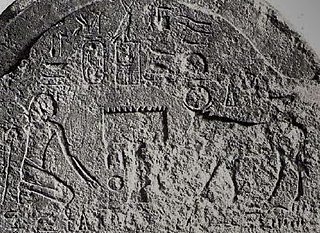
Cambyses II was the second King of Kings of the Achaemenid Empire from 530 to 522 BC. He was the son and successor of Cyrus the Great and his mother was Cassandane.

Darius I, commonly known as Darius the Great, was a Persian ruler who served as the third King of Kings of the Achaemenid Empire, reigning from 522 BCE until his death in 486 BCE. He ruled the empire at its territorial peak, when it included much of Western Asia, parts of the Balkans and the Caucasus, most of the Black Sea's coastal regions, Central Asia, the Indus Valley in the far east, and portions of North Africa and Northeast Africa including Egypt (Mudrâya), eastern Libya, and coastal Sudan.

Tissaphernes was a Persian soldier and statesman, Satrap of Lydia and Ionia. His life is mostly known from the works of Thucydides and Xenophon. According to Ctesias, he was the son of Hidarnes III and therefore the great grandson of Hydarnes, one of the six conspirators who had supported the rise of Darius the Great.
Artabazos was a Persian general in the army of Xerxes I, and later satrap of Hellespontine Phrygia under the Achaemenid dynasty, founder of the Pharnacid dynasty of satraps. He was the son of Pharnaces, who was the younger brother of Hystaspes, father of Darius I. Artabazos was therefore a first cousin of the great Achaemenid ruler Darius I.
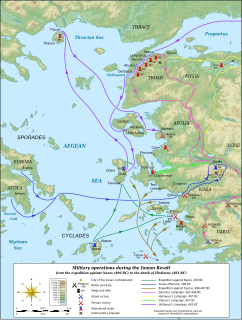
The Ionian Revolt, and associated revolts in Aeolis, Doris, Cyprus and Caria, were military rebellions by several Greek regions of Asia Minor against Persian rule, lasting from 499 BC to 493 BC. At the heart of the rebellion was the dissatisfaction of the Greek cities of Asia Minor with the tyrants appointed by Persia to rule them, along with the individual actions of two Milesian tyrants, Histiaeus and Aristagoras. The cities of Ionia had been conquered by Persia around 540 BC, and thereafter were ruled by native tyrants, nominated by the Persian satrap in Sardis. In 499 BC, the tyrant of Miletus, Aristagoras, launched a joint expedition with the Persian satrap Artaphernes to conquer Naxos, in an attempt to bolster his position. The mission was a debacle, and sensing his imminent removal as tyrant, Aristagoras chose to incite the whole of Ionia into rebellion against the Persian king Darius the Great.

Aristagoras, d. 497/496 BC, was the leader of the Ionian city of Miletus in the late 6th century BC and early 5th century BC and a key player during the early years of the Ionian Revolt against the Persian Achaemenid Empire. He was the son-in-law of Histiaeus, and inherited the tyranny of Miletus from him.
Mardonius was a leading Persian military commander during the Persian Wars with Greece in the early 5th century BC who died at the Battle of Plataea.

Artaphernes, flourished circa 513–492 BC, was a brother of the Achaemenid king of Persia, Darius I, satrap of Lydia from the capital of Sardis, and a Persian general. In his position he had numerous contacts with the Greeks, and played an important role in suppressing the Ionian Revolt.
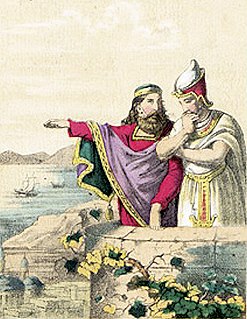
Polycrates, son of Aeaces, was the tyrant of Samos from the 540s BC to 522 BC. He had a reputation as both a fierce warrior and an enlightened tyrant.

Histiaeus, the son of Lysagoras, was a Greek ruler of Miletus in the late 6th century BC. Histiaeus was a Tyrant under Darius I, king of Persia, who had subjugated Miletus and the other Ionian states in Asia Minor, and was in the habit of appointing Greek tyrants to rule the Greek cities of Ionia in his territory.

Zopyrus was a Persian nobleman mentioned in Herodotus' Histories.

The siege of Naxos was a failed attempt by the Milesian tyrant Aristagoras, operating with support from, and in the name of the Persian Empire of Darius the Great, to conquer the island of Naxos. It was the opening act of the Greco-Persian Wars, which would ultimately last for 50 years.

The siege of Eretria took place in 490 BC, during the first Persian invasion of Greece. The city of Eretria, on Euboea, was besieged by a strong Persian force under the command of Datis and Artaphernes.

Masistes was a Persian prince of the Achaemenid Dynasty, son of king Darius I and of his wife Atossa, and full brother of king Xerxes I. He was satrap (governor) of Bactria during his brother's reign, where he attempted to start a revolt in 478 BC.

The siege of Sardis was the first major engagement of the Ionian Revolt. An allied Greek army launched an attack on the Persian satrapal capital of Sardis but were ultimately repelled by Persian forces, however most of the city was set alight during the siege.

The Satrapy of Lydia, known as Sparda in Old Persian, was an administrative province (satrapy) of the Achaemenid Empire, located in the ancient kingdom of Lydia, with Sardis as its capital.

Ionia, known in Old Persian as Yauna, was a region within the satrapy of Lydia, with its capital at Sardis, within the First Persian Empire. The first mention of the Yauna is at the Behistun inscription.

The Achaemenid Empire, also called the First Persian Empire, was an ancient Iranian empire that was based in Western Asia and founded by Cyrus the Great in 550 BC. It reached its greatest extent under Xerxes I, who conquered most of northern and central ancient Greece. At its greatest territorial extent, the Achaemenid Empire stretched from the Balkans and Eastern Europe in the west to the Indus Valley in the east. The empire was larger than any previous empire in history, spanning a total of 5.5 million square kilometres.
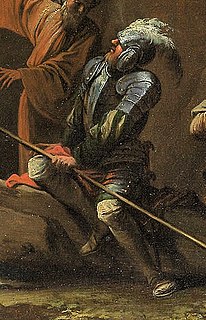
Oroetus, or Oroetes, was a Persian Satrap of Lydia, during the reigns of Cyrus the Great, Cambyses and Darius the Great, succeeding Harpagus, and being followed by Bagaeus. He is described by Herodotus in the third book of his Histories, where he achieved notoriety for the death of Polycrates, tyrant of Samos:
What I will now relate happened about the time of Cambyses' sickness. The viceroy of Sardis appointed by Cyrus was Oroetes, a Persian. This man purposed to do a great wrong; for though he had received no hurt by word or deed from Polycrates of Samos, nor had even seen him, he formed the desire of seizing and killing him. The reason alleged by most was this: — As Oroetes and another Persian, Mitrobates by name, governor of the province of Dascyleium, sat by the king's door, they fell from talk to wrangling and comparing of their several achievements: and Mitrobates taunted Oroetes, saying, "You are not to be accounted a man; the island of Samos lies close to your province, yet you have not added it to the king's dominion — an island so easy to conquer that some native of it rose against his rulers with fifteen men at arms, and is now lord of it. Some say that Oroetes, angered by this taunt, was less desirous of punishing the utterer of it than of by all means destroying the reason of the reproach, namely Polycrates.
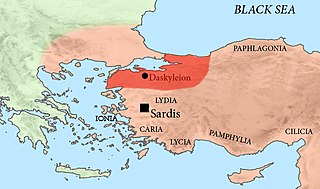
Mitrobates ; was an Achaemenid satrap of Daskyleion under the reigns of Cyrus the Great, who nominated him for the role, and Cambyses. After Cambyses died, and during the struggles for succession that followed, he is said to have been assassinated, together with his son Cranaspes, by the neighbouring satrap of Lydia, Oroetes, who wanted to expand his Anatolian territories. After the assassination, Oroetes added the territory of Hellespontine Phrygia to his own.
After Cambyses had died and the Magians won the kingship, Oroetes stayed in Sardis, where he in no way helped the Persians to regain the power taken from them by the Medes, but contrariwise; for in this confusion he slew two notable Persians, Mitrobates, the governor from Dascyleium, who had taunted him concerning Polycrates, and Mitrobates' son Cranaspes; and besides many other violent deeds, when a messenger from Darius came with a message which displeased him, he set an ambush by the way and killed that messenger on his journey homewards, and made away with the man's body and horse. So when Darius became king he was minded to punish Oroetes for all his wrongdoing, and chiefly for the killing of Mitrobates and his son.



















